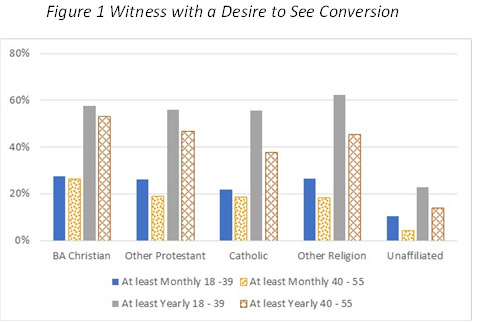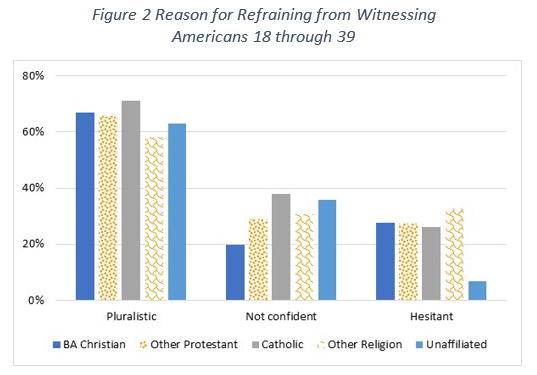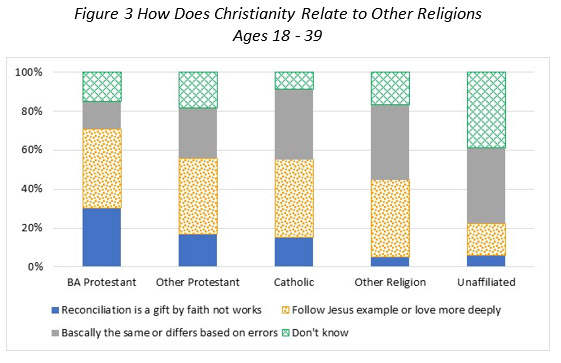Dr. Michael Gleghorn points out that it is not having doubts about our Christian faith that is an issue, but rather how we respond to that doubt. Attacking this issue from a biblical worldview perspective, Michael helps us understand our doubts and respond to them as an informed Christian.
Help! My Doubts Scare Me!

Have you ever doubted your faith? We all have doubts from time to time. We may doubt that our boss really hit a hole-in-one at the golf course last weekend, or that our best friend really caught a fish as big as the one he claimed to catch, or that the strange looking guy on that late night TV show was really abducted by alien beings from a distant galaxy! Sometimes the things we doubt aren’t really that important, but other times they are. And the more important something is to us, the more personally invested we are in it, the scarier it can be to start having doubts about it. So when Christians begin to have doubts about something as significant as the truth of their Christian faith, it’s quite understandable that this might worry or even frighten them.
Reflecting on this issue in The Case for Faith, Lee Strobel wrote:
For many Christians, merely having doubts of any kind can be scary. They wonder whether their questions disqualify them being a follower of Christ. They feel insecure because they’re not sure whether it’s permissible to express uncertainty about God, Jesus, or the Bible. So they keep their questions to themselves—and inside, unanswered, they grow and fester . . . until they eventually succeed in choking out their faith.{1}
So what can we do if we find ourselves struggling with doubts about the truth of Christianity? Why do such doubts arise? And how can we rid ourselves of these taunting Goliaths?
First, we must always remember that sooner or later we’ll probably all have to wrestle with doubts about our faith. As Christian philosopher William Lane Craig observes, “Any Christian who is intellectually engaged and reflecting about his faith will inevitably face the problem of doubt.”{2} Doubts can arise for all sorts of reasons. Sometimes they’re largely intellectual. We might doubt that the Bible is really inspired by God or that Jesus was really born of a virgin. But doubts can take other forms as well. If a person has experienced great sorrow or disappointment, such as personal wounds from family or friends, the loss of a job, a painful divorce, the death of a loved one, or the loss of health, they may be seriously tempted to doubt the goodness, love, and care of their heavenly Father.{3}
Whenever they come and whatever form they take, we must each deal honestly with our doubts. To ignore them is to court spiritual disaster. But facing them can lead ultimately to a deeper faith. As Christian minister Lynn Anderson has said, “A faith that’s challenged by adversity or tough questions . . . is often a stronger faith in the end.”{4}
It’s Not All in Your Head!
Sometimes people have sincere doubts about the truth of Christianity, intellectual obstacles that hinder them from placing their trust in Christ. In such cases, Christians have an obligation to respond to the person’s doubts and make a humble and thoughtful defense for the truth of Christianity. Nevertheless, as Craig observes, it’s important to realize that “doubt is never a purely intellectual problem.” Like it or not, there’s always a “spiritual dimension to the problem that must be recognized.”{5} Because of this, sometimes a person’s objections to Christianity are really just a smokescreen, an attempt to cover up the real reason for their rejection of Christ, which is often an underlying moral or spiritual issue.
I once heard a story about a Christian apologist who spoke at a university about the evidence for Christianity. Afterward, a student approached him and said, “I honestly didn’t expect this to happen, but you satisfactorily answered all my objections to Christianity.” The apologist was a bit startled by such a frank admission, but he quickly recovered himself and said, “Well that’s great! Why not give your life to Christ right now, then?” But the student said, “No. I’m not willing to do that. I would have to change the way I’m living, and I’m just not ready to do that right now.”
In this case all the student’s reasons for doubting the Christian faith had, by his own admission, been satisfactorily answered. What was really holding him back were not his doubts about the truth of Christianity, but a desire to live life on his own terms. To put it bluntly, he didn’t want God meddling in his affairs. He didn’t want to be morally accountable to some ultimate authority. The truth is that a person’s intellectual objections to Christianity are rarely the whole story. As Christian scholar Ravi Zacharias observed, “A man rejects God neither because of intellectual demands nor because of the scarcity of evidence. A man rejects God because of a moral resistance that refuses to admit his need for God.”{6}
Unfortunately, Christians aren’t immune to doubting their faith for similar reasons. I know of a young man who had converted to Christianity, but who’s now raising various objections to it. But when one looks beneath the surface, one sees that he’s currently involved in an immoral lifestyle. In order to continue living as he wants, without being unduly plagued by a guilty conscience, he must call into question the truth of Christianity. For the Bible tells him plainly that he’s disobeying God. Of course, ultimately no one is immune to doubts about Christianity, so we’ll now consider some ways to guard our hearts and minds.
I Believe, Help My Unbelief!
As He came down the mountain, Jesus was met by a large crowd of people. A father had brought his demon-possessed son to Jesus’ disciples, but they were not able to cast the demon out. In desperation the father appealed to Jesus, “If You can do anything, take pity on us and help us!” Jesus answered, “If You can! All things are possible to him who believes.” The father responded, “I do believe; help my unbelief.”{7}
Can you identify with the father in this story? I know I can. Oftentimes as Christians we find that our faith is in precisely the same state as this father’s. We genuinely believe, but we need help with our unbelief. It’s always been an encouragement to me that after the father’s admission of a faith mixed with doubt, Jesus nonetheless cast out the demon and healed the man’s son.{8} But of course no Christian should be content to remain in this state. If we want to grow in our faith and rid ourselves of doubts, what are some positive steps we can take to accomplish this?
Well, in the first place, it’s helpful to be familiar with the “principle of displacement.” As Sue “Archimedes” Bohlin, one of my colleagues, has written:
The Bible teaches the principle of “displacement.” That is, rather than trying to make thoughts shoo away, we are told to replace them with what is good, true, and perfect (Phil. 4:8). As the truth comes in the lies are displaced—much like when we fill a bathtub too full of water, and when we get in, our bodies displace the water, which flows out over the top of the tub.{9}
Once we grasp this principle, a number of steps for dealing with doubt quickly become evident. For one thing, we can memorize and meditate upon Scripture. We can also listen attentively to good Christian music. Paul speaks to the importance of both of these in Colossians 3:16: “Let the word of Christ dwell in you richly as you teach and admonish one another with all wisdom, and as you sing psalms, hymns and spiritual songs with gratitude in your hearts to God.”
In addition, we can read good Christian books that provide intelligent answers to some of the questions we might be asking. Great Christian scholars have addressed almost every conceivable objection to the truth of Christianity. If you have nagging doubts about some aspect of your faith, there’s almost certainly a work of Christian scholarship that speaks to it in detail. Finally, we must never forget that this is a spiritual battle. So let’s remember to put on the full armor of God so we can stand firm in the midst of it!{10}
Faith and Reason
How can we know if Christianity is really true? Is it by reason, or evidence, or mystical experience? Dr. Craig has an answer to this question that you might find a bit surprising.{11} He distinguishes between knowing Christianity is true and showing that it’s true. Ideally, one attempts to show that Christianity is true with good arguments and evidence. But Craig doesn’t think that this is how we know our faith is true. Rather, he believes that we can know our faith is true because “God’s Spirit makes it evident to us that our faith is true.”{12}
Consider Paul’s statement in Romans 8:16, “The Spirit himself testifies with our spirit that we are God’s children.” Since every believer is indwelt by God’s Spirit, every believer also receives the Spirit’s testimony that he is one of God’s children. This is sometimes called the “assurance of salvation.” Dr. Craig comments on the significance of this:
Salvation entails that God exists, that Christ atoned for our sins . . . and so forth, so that if you are assured of your salvation, then you must be assured of . . . these other truths as well. Hence, the witness of the Holy Spirit gives the believer an immediate assurance that his faith is true.{13}
Now this is remarkable. For it means we can know that Christianity is true, wholly apart from arguments, simply by attending to the witness of the Holy Spirit. And this is so not only for believers but for unbelievers, too. For the Spirit convicts the unbelieving world of sin, righteousness, and judgment, particularly the sin of unbelief.{14} So when we’re confronted with objections to Christianity that we can’t answer, we needn’t worry. First, answers are usually available if one knows where to look. But second, the witness of the Spirit trumps any objections we might encounter.
Consider an illustration from the Christian philosopher Alvin Plantinga. Suppose I’m accused of stealing a document out of a colleague’s office. Suppose I have a motive, an opportunity, and a history of doing such things. Suppose further that someone thought they saw me lurking around my colleague’s office just before the document went missing. There’s much evidence against me. But in fact, I didn’t steal the document. I was on a walk at the time. Now should I doubt my innocence since the evidence is against me? Of course not! For I know I’m not guilty!{15}
Similarly, writes Dr. Craig, “I needn’t be shaken when objections come along that I can’t answer.”{16} For my faith isn’t ultimately based on arguments, but on the witness of God’s Spirit.
Stepping into the Light
We’ve seen that both Christians and non-Christians can have doubts about the truth of Christianity. We’ve also seen that such doubts are never just an intellectual issue; there’s always a spiritual dynamic that’s involved as well. But since we’ll probably never be able to fully resolve every single doubt we might experience, I would like to conclude by suggesting one final way to make our doubts flee before us, much as roaches flee to their hidden lairs when one turns on the light!
In John 7:17 Jesus says, “If anyone chooses to do God’s will, he will find out whether my teaching comes from God or whether I speak on my own.” Here, Jesus frankly encourages us to put His teachings to the test and see for ourselves whether He really speaks for God or not. As biblical scholar Merrill Tenney comments, “Spiritual understanding is not produced solely by learning facts or procedures, but rather it depends on obedience to known truth. Obedience to God’s known will develops discernment between falsehood and truth.”{17} Are we really serious about dealing with our lingering doubts? If so, Jesus says that if we resolutely choose to do God’s will, we can know if His teaching is really from God!
Sadly, however, many of us will never take Jesus up on His challenge. No matter how loudly we might claim to want to rid ourselves of doubt, the truth is that many of us just aren’t willing to do God’s will. But if you are, then Jesus says that “you will know the truth, and the truth will set you free.”{18} In other words, we can know by experience that Jesus is from God, that His teachings are true, and that He really is who He claimed to be!
As Christian philosopher Dallas Willard observes, the issue ultimately comes down to what we really want:
The Bible says that if you seek God with all your heart, then you will surely find him. Surely find him. It’s the person who wants to know God that God reveals himself to. And if a person doesn’t want to know God—well, God has created the world and the human mind in such a way that he doesn’t have to.{19}
The psalmist encourages us to “taste and see that the Lord is good.”{20} If we do, we can know not only that God is good, but also that He exists. And even if we still have some lingering doubts and unanswered questions in the back of our minds, as we surely will, they’ll gradually fade into utter insignificance as we become more intimately acquainted with Him who loves us and who reconciled us to Himself through the death of His Son!{21}
Notes
1. Lee Strobel, The Case for Faith (Grand Rapids, Mich.: Zondervan, 2000), 316.
2. William Lane Craig, Hard Questions, Real Answers (Wheaton, Ill.: Crossway Books, 2003), 31.
3. Lynn Anderson, interviewed in Lee Strobel, The Case for Faith, 322.
4. Ibid., 326.
5. Craig, Hard Questions, Real Answers, 33.
6. Ravi Zacharias, quoted in Strobel, The Case for Faith, 343. See also John 3:19-21.
7. Mark 9:14-24.
8. See Mark 9:25-29.
9. Sue Bohlin, “I’m Having a Terrible Battle in My Mind,” Probe Ministries, probe.org/im-having-a-terrible-battle-in-my-mind/.
10. See Ephesians 6:10-20.
11. This section is largely just a summary of the discussion of faith and reason in Craig, Hard Questions, Real Answers, 35-39.
12. Ibid., 35.
13. Ibid., 36.
14. See John 16:7-11.
15. Alvin Plantinga, “The Foundations of Theism: A Reply,” Faith and Philosophy 3 (1986): 310; cited in Craig, Hard Questions, Real Answers, 38-39.
16. Ibid., 39.
17. Merrill C. Tenney, “The Gospel of John,” in The Expositor’s Bible Commentary, ed. Frank E. Gaebelein, vol. 9 (Grand Rapids: Zondervan Publishing House, 1981), 84.
18. John 8:32.
19. Dallas Willard, quoted in Strobel, The Case for Faith, 352.
20. Psalm 34:8.
21. See 2 Corinthians 5:18-21.
© 2007 Probe Ministries
 Looking at the detailed results, all religions except the Unaffiliated showed very similar results: over 20% (1 in 5) of those witnessed at least monthly and about half witnessed at least yearly. So, it would appear that there is a lot of witnessing going on with very few conversions.
Looking at the detailed results, all religions except the Unaffiliated showed very similar results: over 20% (1 in 5) of those witnessed at least monthly and about half witnessed at least yearly. So, it would appear that there is a lot of witnessing going on with very few conversions. We also asked the question: “When I refrain from communicating my religious belief with someone, it’s usually because:”
We also asked the question: “When I refrain from communicating my religious belief with someone, it’s usually because:” The results are charted in the graph to the right. First, notice the interesting result that only about 30% of Born Again Protestants selected ‘reconciliation is a gift’ while 40% selected following Jesus’ example or love others more deeply. As noted above, this second answer is not inconsistent with the concepts of Christianity but is not as fundamental as the first. However, selecting this answer over reconciliation is a gift’ is consistent with what we saw earlier: 70% of Born Again Christians are not exclusivists.
The results are charted in the graph to the right. First, notice the interesting result that only about 30% of Born Again Protestants selected ‘reconciliation is a gift’ while 40% selected following Jesus’ example or love others more deeply. As noted above, this second answer is not inconsistent with the concepts of Christianity but is not as fundamental as the first. However, selecting this answer over reconciliation is a gift’ is consistent with what we saw earlier: 70% of Born Again Christians are not exclusivists.